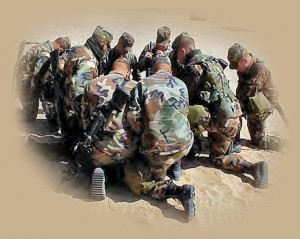And they devoted themselves to the apostles’ teaching and the fellowship, to the breaking of bread and the prayers. (Acts 2:42)
 As we study this verse, a portrait of the church emerges. This portrait shows diverse believers giving themselves to learning and living by the word of God, sharing their lives and praying together. Praying together is the topic of this sermon.
As we study this verse, a portrait of the church emerges. This portrait shows diverse believers giving themselves to learning and living by the word of God, sharing their lives and praying together. Praying together is the topic of this sermon.
Many pastors believe that even in the seemingly healthiest churches, only about 10% of those who attend the worship service would attend a prayer meeting. Yet here we see that being the church means devoting ourselves to prayer.
In an effort to understand what devotion to prayer looked like in the early church, I combed Acts and studied each example of the church at prayer. Three characteristics stand out: Togetherness, Devotion and Power.
Togetherness
Charles Finney wrote, “Nothing tends more to cement the hearts of Christians than praying together.” In Acts, the church prayed together while they awaited further direction from the Lord (1:14). They huddled in homes, praying for their endangered brothers (4:23-33 and 12:12). When Paul was leaving, they knelt in prayer together in an upper room and on a beach (20:36 and 21:5-6). They did not just devote themselves to the prayers; they devoted themselves to praying together.
Many church members are deeply uncomfortable with group prayer. Some are uncomfortable because they have no real relationship with God and therefore don’t pray in “normal” life. Others are uncomfortable because they are introverts who prefer to keep quiet in any social situation.
Let’s tackle the first problem: no relationship with God. This is one of the great things about regular prayer together. It dissolves pretense. Or, at least, it forces us to face the truth about our relationship with God. So much of our church activity is designed so that those who do not trust and follow Jesus can participate comfortably. Group prayer is something of an antidote to this phenomenon.
For example, a man who has no real relationship with Jesus could sit under a sermon beside those who are trusting and following Jesus with all their hearts and no one but God could tell the difference. He could get involved in the fellowship of believers, sharing his time and money, even breaking bread with them and no one but God could tell that he remains a stranger to Christ. But, pull that man into a huddle of praying Christians and the heat goes up. He is in that moment, in a very real way, face to face with the God that knows him through and through, in the company of those he has deceived. He must either come clean with himself and those around him, or blaspheme God by lying to his face. For this man, there is very good reason to be uncomfortable in group prayer.
As for the problem of introversion; this really is no problem at all. Saying prayers out loud together isn’t the point. What matters is that we grow humbly dependent upon God and relate to him as his children together—and that we do so honestly. So the introverted believer in communal prayer may never utter a work out loud, but may participate silently in full fellowship with God and brother.
However, we must be careful not to use introversion as an excuse for hiding from one another. As Jesus’ work in our hearts continues, we grow increasingly humble and therefore increasingly okay with transparency. Over time, our need for fig leaves fades and we can pray together with increasing freedom.
Devotion
The Greek word translated “devoted” in Acts 2:42 is used 10 times in the New Testament and five of those are in connection with prayer (Romans 12:12; Acts 1:14; 2:42; 6:4; Colossians 4:2). We are not just to say prayers; we are to devote ourselves to the prayers.
Devotions are like default settings. What you do when you have free time is your devotion. What you wish you were doing when you are not free is your devotion. What you invest your resources in is your devotion. Those interests that unite you with your closest friends are your devotions.
As the church, changed by the gospel and empowered by the Holy Spirit, our devotions are shifting from worldly things to the teaching, fellowship, bread-breaking and prayers. We are growing to look more like the Acts church who defaulted to prayer when:
– They needed direction (1:12-14)
– They celebrated (4:23-31)
– They charged forward in great commission work
– They dealt with interpersonal conflict and organizational challenges (6:1-6)
– They chose and commissioned ministers (6:6; 13:3; 14:23)
– They needed forgiveness (8:22)
– They needed healing (9:40)
– They needed rescue (12:5, 12)
Power
And they tapped into the powerful resources of God through this devotion. As they prayed together, the ground shook beneath their knees; the Holy Spirit filled them; they received forgiveness, direction and rescue; the dead were raised and the sick healed; entire people groups received the gospel; servants and leaders arose from among them to lead the church forward.
We too will find power as we devote ourselves to praying together.
Discussion Starters
- Read Acts 2:42. Which of the four devotions (teaching, fellowship, bread-breaking and prayer) do you find most lacking in Dulin’s Grove? Why do you think this is? What steps can you as a group take to strengthen your devotion to these things?
- What are your thoughts about praying together? What hesitations do you have? What are some good experiences you’ve had? Some bad ones?
- Do you think it’s possible that we as a church could be devoted to these things like the early church was? What might the average week of a Dulin’s Grove member look like if we were?
- What supernatural power do you need in your life? Share with the group and pray together for one another and our church.





